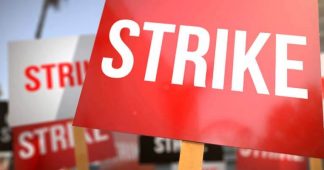Gov’t vows to end fuel shortage by forcing oil refinery strikers back to work
Oct 12, 2022
Fuel sales restrictions were imposed by another French regional administration on Wednesday, joining several others amid continued labor strikes at oil refineries, local authorities announced.
The southern department of Pyrenees-Orientales joined other regions, including Vaucluse, Alpes-de-Haute-Provence, Hautes-Alpes, and Herault, in capping purchases for small vehicles at 30 liters (about 8 gallons) of fuel per day, while large vehicles will be able to receive a daily 120 liters, the local administration said on Twitter.
Certain priority vehicles, such as fire trucks, police cars, ambulances, school buses, and farmers’ and cold food chain vehicles, will receive special fuel quotas under the measures, expected to end on Friday.
Authorities have promised to end an ongoing fuel shortage in the country, despite a call by the country’s largest labor union to resist a government decision to force striking oil refinery workers back on the job.
France’s Ministry of Ecological Transition announced on Wednesday that it would force strikers at a refinery in the northern region of Normandy to work.
Workers at the ExxonMobil refinery in Gravenchon-Port-Jerome, among others, have been striking for better pay and working conditions.
After the decision, taken on the grounds that the walkout has led to a social crisis, government spokesman Olivier Veran said fuel would be transferred to gas stations in the next few days, returning the situation to normal.
As a result of the shortage, a third of French gas stations are struggling with supply bottlenecks, with long queues seen outside the gas stations that are still supplied with fuel.
Prime Minister Elisabeth Borne said earlier that the government was considering using force to order staff at the ExxonMobil refinery to work in order to secure energy supplies.
Despite the threat, major labor unions have decided to continue their strike.
The Gravenchon refinery is one of two Esso-ExxonMobil refineries on strike. It is joined by four TotalEnergies Group refineries.
French law allows, in the event of a strike that seriously affects the continuity of the public service or the needs of the population, that certain employees may be forced to work.
*Writing by Ahmet Gencturk
We remind our readers that publication of articles on our site does not mean that we agree with what is written. Our policy is to publish anything which we consider of interest, so as to assist our readers in forming their opinions. Sometimes we even publish articles with which we totally disagree, since we believe it is important for our readers to be informed on as wide a spectrum of views as possible.











